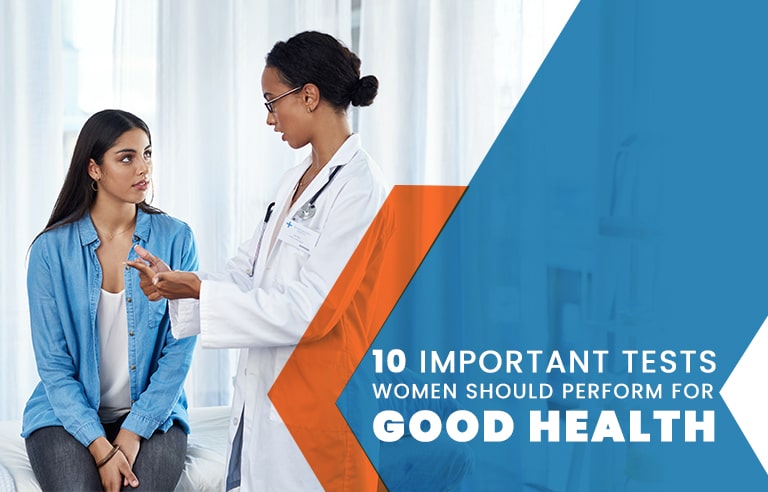
You are exercising regularly, eating the right foods and reserving some time to relax yourself and recharging for the next day. Doesn’t this sound great? But are you performing the health screenings every woman should have? Certain tests and screenings may add years to a woman’s life when the disease is detected early and it is most treatable. Screening tests and well woman check up to conduct will depend on your age, family history, own health condition and other risk factors. Continue reading to know about 10 tests every woman need to conduct to stay healthy and prevent unnecessary diseases.
- Pap smear – Also called a Pap test, this is a screening method for cervical cancer to test the presence of cancerous or precancerous cells on the cervix. Screening should begin from 25 years as some women may be at greater risk for infection or cancer. You may need frequent tests when you are HIV positive or have a weak immune system for organ transplant. If you are above 26 and have had abnormal Pap tests, then ask the doctor whether you need to conduct one in every five years. This test can be combined with human pappilomavirus or HPV screening. Women in the age group of 25 to 65 years need to have an HPV test once in every five years.
- Diabetes screening – This should start at the age of 35 and be repeated in every three years even when you do not have any risk factors for getting diabetes. Screening may be done earlier or more frequently when there are risk factors such as – family history, high pressure, obesity or overweight or history of heart disease. Women who are planning to get pregnant need to be screened before they conceive or for unplanned pregnancies during their first prenatal visit. Pregnant women need to be screened for gestational diabetes between 24 and 28 weeks of pregnancy.
- Sexually transmitted diseases – STDs are usually symptomless which means you can pass it to your partner or to an unborn child during pregnancy. Sexual health screenings should start as soon as you are sexually active. All sexually active women need to get screened at least once in a year for chlamydia and gonorrhoea. Additional tests should be conducted at any age who have new sex partners or are at greater risk of getting STDs. It is important to discuss about STDs and pregnancy prevention with the provider even if you are not sexually active.
- Check your breasts – A mammogram helps to screen for breast cancer and involves compressing the breast between plates so that X-ray images of breast tissue may be captured. It is necessary to know how often and when a woman should perform this test for detecting the risk for breast cancer with age. Women should start screening at the age of 50 and continue to have one in every two years till 74 years. Those in the age group of 40 to 50 who want to get screened need to speak with the doctor. It is suggested that women start yearly screenings at the age of 45 and then change to biannual mammogram at 55 years.
- Skin check – Regular skin check increases the chance of detecting colour changes or suspicious moles, if you have fair skin tone or are exposed to the sun. You need to conduct skin examination every year with the dermatologist from the age of 40. Carefully inspect your skin to detect any new moles, blemishes or existing moles which may be early signs of skin cancer, If you are at a greater risk for skin cancer or have a family record for it, it is advisable to consult with skin specialist about how often you need to conduct in-office exam.
- Know your blood pressure – High blood pressure or hypertension is among the key factors for getting cardiovascular disease. This is the leading cause of death among women these days. So, it is advisable to conduct regular blood pressure screenings with a simple test by using a cuff around the arm and calculate blood force through the vessels. The screening should begin from 20 years. If the blood pressure is less than 120/80 millimeters of mercury (mmHg), this is the ideal reading. You may get it checked at least once in every two years till 40 years and then annually after that. But when it is higher, you may be asked to have it checked often.
- Cholesterol test – Cholesterol tests for women should start from 45 years without any risk factors and at 20 years for the ones with risk factors. It is a condition which hardens the arteries or atherosclerosis. High cholesterol may cause plaque to clog your arteries. This plaque can build up for many years without showing any symptoms thereby, causing a heart attack or stroke suddenly. Some risk factors include – diabetes, high blood pressure, kidney or heart disease and other medical conditions. Taking some medications and certain changes in your lifestyle may lessen the risk.
- Bone profile testing – This is a set of blood tests for assessing health of your bones. Women need to test their bone density from 65 years and the frequency of the examinations depends on the results of earlier tests. It can identify bone-related disorders such as – Paget’s disease, osteoporosis and other bone metabolism disorders. The test will help to screen for osteoporosis when bones become less dense and more brittle, leading to greater risk of fracture.
- Menopausal health – Menopause marks the end of your menstrual cycle which is diagnosed after you have undergone 12 months without period. This generally happens in your 40s or 50s and physical symptoms include – hot flashes, emotional stress disrupting sleep, pain during intercourse, mood swings, depression, decrease in energy level or affect emotional health. On the other hand, others do not find any trouble with the symptoms and may feel relieved about not worrying for getting pregnant or painful period. There are effective treatments available from changes in your lifestyle to hormone therapy.
- PCOS test – This is a common disorder of your hormone causing problems with fertility, period, weight and skin. If you have irregular periods or feel there are cysts in your ovaries, it is advisable to see a doctor. He may perform certain tests to know whether you have PCOS. But there is no single test to diagnose polycystic ovary syndrome. Though there isn’t any cure for PCOS, the good news is that it can be treated.
Apart from the ones discussed above, you should conduct yearly well woman visits from the age of 21. The provider will check your blood pressure, present health concerns and discuss family history so that you can perform early screenings, if necessary and remain in good health. You may type in Google search box, “private well woman clinic near me” when finding a clinic in your area and get yourself checked in the most convenient way.



-min.jpg)

